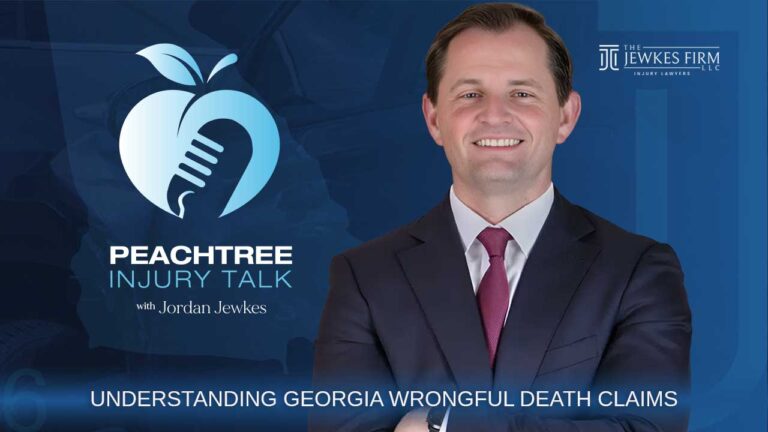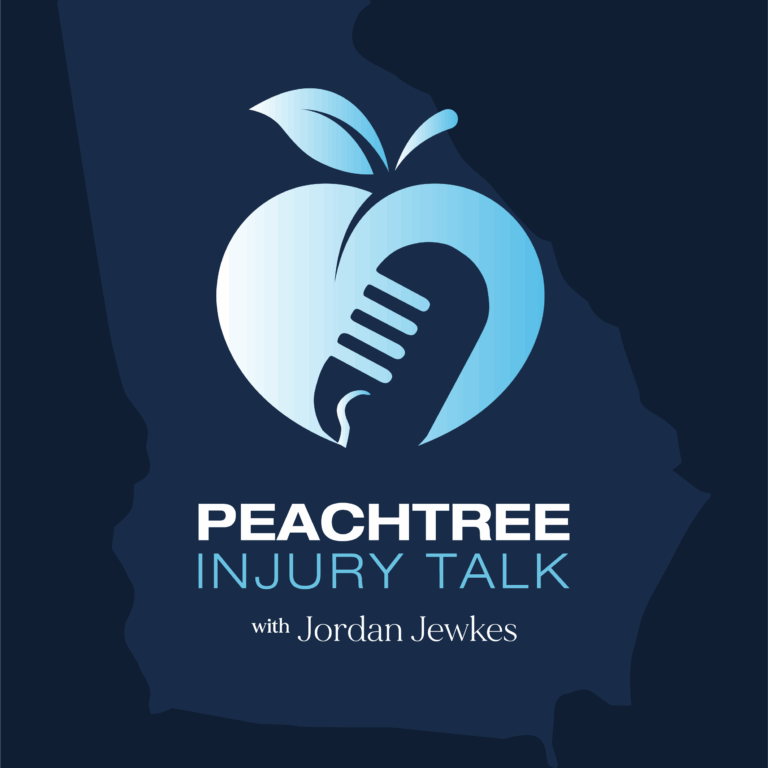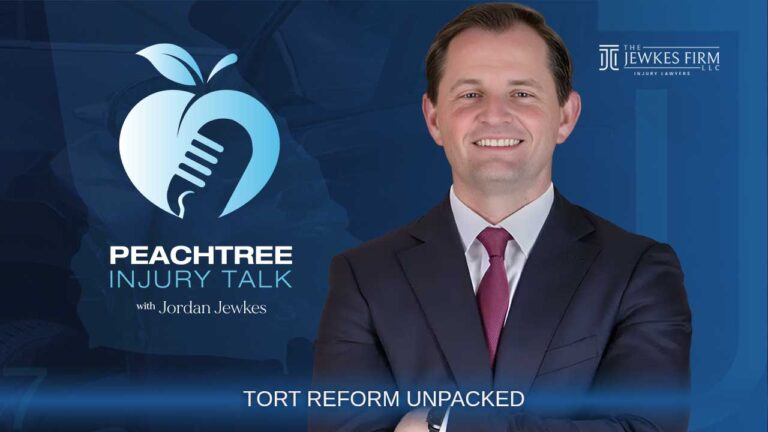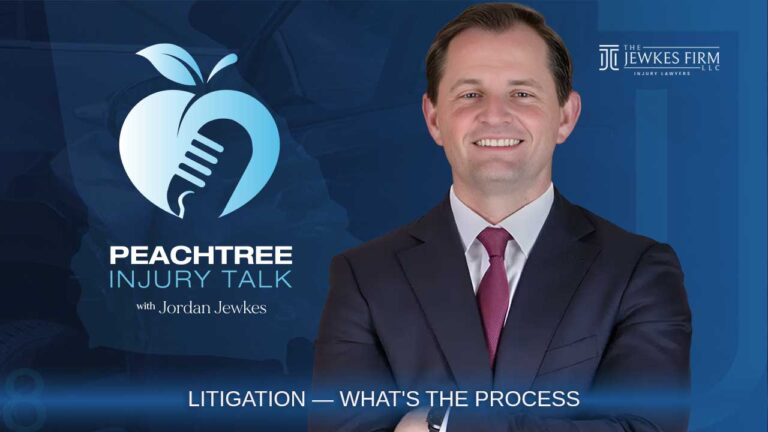
Understanding Georgia Wrongful Death Claims
In this episode of Peachtree Injury Talk, attorney Jordan Jewkes breaks down wrongful death claims in Georgia, discussing situations such as car accidents, medical malpractice,
Home | Podcasts | Peachtree Injury Talk | How to Choose the Best Injury Attorney for Your Claim (and What Red Flags to Watch for)
Peachtree Injury Talk with Jordan Jewkes
In this episode of Peachtree Injury Talk, attorney Jordan Jewkes sits down with host Kevin Rosenquist to discuss the important factors to consider when choosing a personal injury attorney. They dive into red flags to watch out for and the pitfalls of hiring the wrong legal representation. Jordan emphasizes the significance of experience, specialization in personal injury law, and building trust with an attorney. They also talk about the importance of local knowledge, and communication, and how to avoid attorneys who rely too heavily on advertising. Tune in to hear valuable tips on how to protect your rights and get the best possible outcome for your injury case.
| 00:00 | Narrator: Welcome to Peachtree Injury Talk with attorney Jordan Jewkes. |
| 00:04 | Kevin Rosenquist: Hello and welcome to Peachtree Injury Talk with Jordan Jewkes. Jordan strives to give injured victims a voice and provides strong advocacy against an often broken system. I am your host, Kevin Rosenquist, and today's episode is all about how to choose the best injury attorney for your claim—and what red flags you should watch out for. Jordan, welcome back. |
| 00:27 | Jordan Jewkes: Hey, thanks Kevin, glad to be here. Looking forward to chatting with you today. |
| 00:30 | Kevin Rosenquist: Yeah, glad to have you. So let’s start here—what are the most important qualities people should look for in a personal injury attorney? |
| 00:38 | Jordan Jewkes: That’s a really important decision. When you’re injured and possibly heading toward litigation against an insurance company, you’ve really got one shot to get it right. So you want someone who will work hard, someone you can trust, and someone with experience and a proven track record. You don’t want to mess that up. |
| 01:22 | Kevin Rosenquist: How important is it to have someone who specializes in personal injury versus a general practitioner? |
| 01:29 | Jordan Jewkes: It’s incredibly important. Obviously, I’m biased, but there are so many specific legal pitfalls in personal injury law—especially with cases like trucking accidents, medical malpractice, or injuries involving police or security. It’s risky to hire a generalist. I read about a case where someone with a permanent disability hired a business attorney they knew from church. That attorney didn’t disclose they had no experience with injury law. They missed the statute of limitations for filing the lawsuit, and the client lost the right to make a claim. That’s devastating—and irreversible. |
| 03:36 | Kevin Rosenquist: Technically, people can represent themselves though, right? |
| 03:39 | Jordan Jewkes: Yeah, technically you can pursue a claim on your own. But it’s not recommended. I've had people call me after filing pro se and say, “I messed up, can you help me?” And it’s really hard to step in once mistakes have already been made. We went to law school and trained for years to navigate this process. There’s just too much complexity for most people to handle without legal help. |
| 05:10 | Kevin Rosenquist: So let’s say someone is vetting attorneys—what kinds of questions should they ask to assess experience and reliability? |
| 05:24 |
Jordan Jewkes: Great question. Some key ones would be:
|
| 06:42 | Kevin Rosenquist: I can’t think of any other type of attorney you see advertised more than personal injury lawyers. |
| 06:47 | Jordan Jewkes: You’re exactly right. Billboards, radio, Instagram—some attorneys are just nonstop advertisers. And that’s legal, and some are good attorneys. But clients need to ask themselves: do I want the biggest advertiser, or do I want the attorney with the best results and happiest clients? |
| 07:33 | Kevin Rosenquist: What should clients understand about contingency fees and other costs? |
| 07:38 | Jordan Jewkes: Contingency fees are standard in personal injury. The attorney only gets paid if the client wins or settles. Usually it's one-third of the recovery, plus expenses. You’ve probably heard horror stories where the client got almost nothing after legal fees and medical bills. A good attorney will make sure the client walks away with money in their pocket and their bills paid. If a firm has a reputation for taking everything while the client gets nothing—that’s a huge red flag. |
| 08:54 | Kevin Rosenquist: And as we’ve discussed, injury compensation goes beyond medical bills—it includes lost wages, pain and suffering, and more. |
| 09:00 | Jordan Jewkes: Exactly. And before a case is settled, clients should know—at least roughly—how much will go in their pocket and how much will go to medical bills and fees. A good attorney will also negotiate with doctors to reduce those bills when possible. |
| 09:41 | Kevin Rosenquist: What other red flags should people watch for when choosing an attorney? |
| 09:53 | Jordan Jewkes: Reviews are important. Check Google, Yelp, or other sources. Most people can tell the difference between fake and legitimate reviews. Another big red flag is ultra-low fees. If a firm is offering 20% or 25%—way below the industry standard—it usually means you’re going to get less service. Running a good injury law firm takes resources. If someone’s charging well below average, it’s likely their staff is underqualified and underpaid—and the quality of work will reflect that. It’s like choosing a surgeon—you don’t pick the cheapest one. You pick the best one and work out the cost if needed. |
| 11:30 | Kevin Rosenquist: Yeah, if they’re the cheapest, there’s usually a reason for that. And it’s probably not a good one. |
| 11:38 | Jordan Jewkes: Exactly. When people aren't fairly compensated, they don’t do their best work. And that shows in the service you get. |
| 12:01 | Kevin Rosenquist: What are the advantages of hiring a local attorney—someone who knows Georgia courts? |
| 12:08 | Jordan Jewkes: Huge advantages. Local attorneys know the judges, know the courtrooms, and understand what juries in the area tend to do. That matters a lot. Also, with a local attorney, you can walk into their office. If something goes wrong, they’re accountable. You see them in the community—in church, at school—you know they’re not disappearing on you. And yeah, you can bring in a big-city attorney like My Cousin Vinny—great movie by the way—but if they don’t know the local rules or the jury pool, that can be a big disadvantage. |
| 13:17 | Kevin Rosenquist: What are the biggest mistakes people make when choosing an attorney or starting a case? |
| 13:28 | Jordan Jewkes: The biggest one is never talking to an actual attorney. Some firms are set up like mills where a low-level staffer pushes paperwork and you never speak to the person supposedly handling your case. That’s a problem. The person managing your case should be a licensed attorney. We regularly get calls from people who’ve been with a big firm for six months and haven’t spoken to a lawyer once. That’s not okay. |
| 14:20 | Kevin Rosenquist: At what point after an accident should someone reach out to an attorney? |
| 14:36 | Jordan Jewkes: It’s never too soon. Obviously, get the medical care you need first. But once you know you’ve been injured, contact an attorney as soon as you can—within a few days or a week. The sooner the better. |
| 15:00 | Kevin Rosenquist: Alright, well thank you for joining us on Peachtree Injury Talk with Jordan Jewkes. To connect with Jordan and his team, visit jewkesfirm.com (https://www.jewkesfirm.com). Please like and subscribe to our channel, and leave us a review—we always appreciate it. Jordan, always appreciate your time. Thanks so much. |
| 15:20 | Jordan Jewkes: Thanks, Kevin. |
| 15:21 | Narrator: Thanks for watching. Be sure to hit that like and subscribe button and leave us a review in the comments. |

Peachtree Injury Talk is a podcast by Kevin Rosenquist featuring legal insights and practical advice from Georgia-based attorney Jordan Jewkes. The show focuses on personal injury law, offering listeners expert guidance on navigating insurance claims, understanding legal processes, and protecting their rights after an accident. Each episode dives into real-life case examples, common challenges injured individuals face, and actionable tips for dealing with insurance companies and legal hurdles.
Episode Summary
In this episode of Peachtree Injury Talk, attorney Jordan Jewkes reveals the truth behind how insurance adjusters try to deny, delay, and devalue legitimate injury claims. Insurance adjusters are trained to minimize payouts—and they’re often rewarded for doing so. Jordan explains how they manipulate claims, push early settlements, and mislead injury victims. He warns against speaking to adjusters about injuries, highlights the risks of handling a claim without legal help, and stresses the importance of hiring a firm with a reputation for fighting back. If you’re hurt in an accident, stay cautious, don’t accept early money, and get legal advice before signing anything.
Timestamps
00:00 – Introduction to Peachtree Injury Talk
00:31 – Common tactics by insurance adjusters
02:04 – Insurance adjusters’ incentives explained
03:26 – Advice on handling low settlement offers
06:44 – Should you talk to the insurance adjuster?
09:03 – Pitfalls of handling claims without an attorney
12:53 – Dealing with aggressive insurance adjusters
16:49 – When to consult an attorney for claims
About the Show
Peachtree Injury Talk is hosted by attorney Jordan Jewkes, who is dedicated to giving injury victims a voice and fighting for their rights against an often unfair system. Each episode provides valuable legal insights and practical advice for those navigating personal injury claims.

How to Choose the Best Injury Attorney for Your Claim (and What Red Flags to Watch for) breaks down how to choose the best injury lawyer for a claim and the red flags to watch for. Jordan emphasizes that selecting the right attorney is crucial, especially when facing complex legal situations like personal injury claims, where one misstep can lead to devastating consequences.
Jordan explains that experience, trustworthiness, and a proven track record are essential qualities to look for in an attorney. He strongly recommends hiring a lawyer who specializes in personal injury law rather than a generalist, as personal injury cases often involve specific legal pitfalls. He shares a story about a person who hired a business attorney without injury law experience, which resulted in missing the statute of limitations and losing the right to file a claim. Such mistakes are irreversible and can be financially and emotionally harmful.
While it’s technically possible to represent oneself (known as “pro se” representation), Jordan warns against it. He explains that navigating the complexities of personal injury law is difficult without professional training. Many people who try to handle their own legal issues end up needing a lawyer to correct their errors, but by then, it’s usually too late.
When vetting potential attorneys, Jordan suggests asking important questions like: “Have you handled cases like mine before?” and “What results have you gotten in similar cases?” He also advises clients to ensure that they are speaking directly with the attorney who will handle their case, rather than relying on someone behind a flashy advertisement. The rise of aggressive advertising by personal injury firms—through billboards, radio, and social media—has led to a situation where clients often need to ask themselves whether they want the most well-known attorney or the one with the best results and client satisfaction.
Jordan also discusses contingency fees, which are the standard in personal injury cases. These fees mean the lawyer only gets paid if the client wins or reaches a settlement, usually taking one-third of the amount received. However, Jordan cautions clients to be wary of firms that take excessive fees or those with a reputation for leaving clients with little compensation after medical bills and legal fees.
Red flags to watch for include ultra-low fees (which often signal underqualified staff) and fake or suspicious reviews. Just like choosing a surgeon, clients should not opt for the cheapest option, as it could indicate poor service. Additionally, Jordan highlights the advantages of hiring a local attorney who knows the local court systems, judges, and juries, which can significantly impact the outcome of a case.
Finally, Jordan advises that the biggest mistake people make is not speaking to a real attorney. Many firms operate like “mills” where low-level staff handle cases, and clients never interact with an attorney. He stresses that clients should contact an attorney as soon as possible after an injury—ideally within a few days to a week—to ensure the best possible outcome.
In conclusion, Jordan underscores the importance of choosing the right attorney, asking the right questions, and avoiding common pitfalls that could jeopardize a personal injury case. For more information, reach out to The Jewkes Law Firm at (770) 771-5130.
This show is designed to deliver general information regarding the law. Our guests will not provide tailored legal advice. If you have a personal issue and need legal support, get in touch with us for a free consultation with a Jewkes Firm attorney.
Subscribe to our newsletter for essential updates and expert legal advice.

In this episode of Peachtree Injury Talk, attorney Jordan Jewkes breaks down wrongful death claims in Georgia, discussing situations such as car accidents, medical malpractice,

In this episode, Jordan shares his perspective on why tort reform often benefits large corporations at the expense of individual rights and access to fair

In this episode, Jordan Jewkes explains the litigation process, why it can be time-consuming, and what injured victims should expect when filing a lawsuit. He
The information you obtain at this site is not, nor is it intended to be, legal advice. You should consult an attorney for advice regarding your individual situation. Contacting us does not create an attorney-client relationship.
